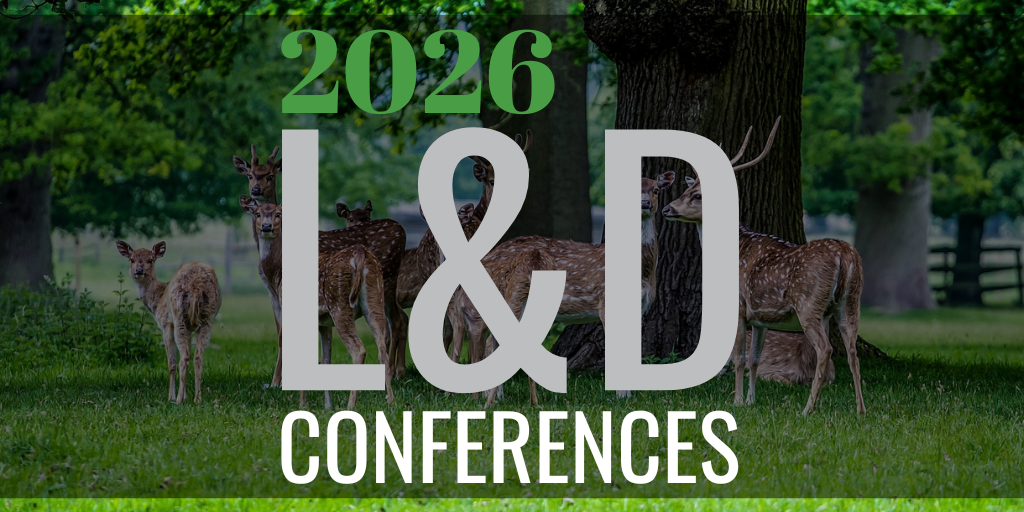Free T&D webinars for July 2014
/Happy summer! July is just around the corner, and so is that baking summer heat we look forward to every year. It’s fun to bask in the sun, but when you’re ready for some shade, why not check out a free webinar or two? July is full of good ideas—we hope they will inspire and motivate you.
Tuesday, July 1, 2014, 10AM – 11AM PST: Designing eLearning for Maximum Motivation
When asked to identify the weakness in most eLearning, designers and students alike often note the failure to engage the learner’s attention as a chief problem. The problem is, “How do you motivate the learner while still doing the serious work of instruction?”
In this webinar, Ethan Edwards will explore the importance of motivation in the design framework for eLearning and present rules for creating maximally motivating eLearning, which will be illustrated through several successful corporate eLearning courses. In this webinar, learn to:
Analyze the importance of motivation in an eLearning design framework
Apply six rules for creating maximally motivating eLearning solutions
Examine design considerations for content, scope, difficulty, judgment, levelling, content placement, and user control
Tuesday, July 1, 2014, 11AM – 12PM PST: Absolutely, Positively Achieve Level 4 Outcomes (Free for ATD members)
In this webinar, James Pepitone will brief you on what experienced work design consultants know about how to increase business results that are specifically dependent on people. James will help you see and understand the broader system of challenges involved. He also will share numerous stories from his work partnering with his clients’ training and development functions to create Level 4 business results. Participants will learn:
Why most training programs do not achieve Level 4 outcomes
The primary factors determining business results dependent on people
How to respond more effectively to the expectations of managers
How to absolutely, positively achieve Level 4 outcomes
Wednesday, July 9, 2014, 10AM – 11AM PST: How to Create a Learning Measurement Strategy
In this session, you'll learn the essential steps needed to build a learning measurement strategy to sustain a practical and scalable measurement process. The session will also explore the key elements to build the measurement culture, including leadership, skills, tools, and technology. Real-world examples of measurement strategy in practice will be provided. This webinar will:
Provide an overview of learning measurement strategy
Discuss the criteria to create a strategy that sustains a measurement process
Listen to real-world examples of how learning measurement strategy is successful
Wednesday, July 9, 2014, 10AM – 11AM PST: Research Spotlight: Workforce Management Trends
Workforce management is often the misunderstood stepsister of the Human Capital world. Images of timecards and payroll reconciliations can be shudder-inducing. But today's modern workforce management is all about how organizations can use technology to optimize processes and help improve efficiency, effectiveness, and employee engagement.
Join Mollie Lombardi, Brandon Hall’s new Principal Analyst covering Workforce Management, as she discusses:
What workforce management means to today's organizations
How technology can drive transparency, integration, and analytics to drive business results
Where workforce and talent management intersect, and how to manage the integration points
The role of mobile tools and modern business intelligence in optimizing the workforce
Wednesday, July 9, 2014, 11AM – 12PM PST: Talent Development Reporting Principles (TDRp): Standards for the Reporting and Management of Human Capital (Free for ATD members)
Talent Development Reporting Principles (TDRp) is an industry-led initiative to develop and implement internal reporting and management standards for all key human capital processes, such as L&D, leadership development, and talent acquisition. TDRp employs common industry measures to create three standard statements and three standard management reports to enable practitioners to run talent like a business, ensuring that planned, measurable outcomes are delivered effectively and efficiently. In this webinar, Dave Vance will discuss what types of measures should be reported. He also will explain how to:
Organize measures into three standard TDRp statements
Create three management reports from the key measures in the three statements
Show alignment and expected impact of talent initiatives
Use the reports to execute with discipline
Thursday, July 10, 2014, 11AM – 12PM PST: Connecting Learning to the Bottom Line and Showing Impact(Free for ATD members)
In this webinar, Martha Soehren, the chief talent development officer at Comcast, will present a compelling case for using a governance structure to help drive the learning agenda and learning strategy with a keen focus on aligning learning outcomes to business metrics. The Comcast team of 500 L&D professionals uses a standard training measurement strategy that leverages Kirkpatrick’s model and connects the dots from analysis to evaluation. Martha will share a couple of business impact stories and some of the lessons learned from their work. This work is important to Comcast as the largest mass media and communications company in the world by revenue. It is also the largest cable company and home Internet service provider in the United States, and the nation's third largest home telephone service provider.
Tuesday, July 15, 2014, 10AM – 11AM PST: How and When to Allow Learners to Cheat in Compliance Courses
Experience shows us that learners try to circumvent or trick the learning process or "cheat" the eLearning compliance course. This behaviour often happens when the requirements of the compliance course are impossible to meet or are completely unreasonable. In the process, the learners find a workaround that designers, developers, and trainers condone. How do we address the dilemma about rigid, inflexible, tracking-only types of eLearning? How do we make a difference in spite of our limited capacities and roles? In the webinar, you will learn:
What can be done to reduce the pain of boredom and poor learning in compliance courses?
How do you engage learners during the certification course, even with rigid tracking requirements?
How do you differentiate between the typical compliance course and story-based compliance course learning environments?
How can you help learners obtain a few main ideas, yet still comply with the tracking requirements?
How do you find opportunities to identify must-learn content and apply the “embedding technique” in stories used in your course?
How do you avoid confusing the administrative control function with the learning function of compliance courses?
Tuesday, July 15, 2014, 10AM – 11AM PST: Manage More Effectively with Emotional Intelligence (Free for ATD members)
It is said that emotional intelligence (EQ) is the key indicator of our success in business, relationships, leadership, and even in our personal happiness. But what makes EQ so important?
This webcast will help you understand how better relationships produce better results. When leaders have EQ skills, team members are motivated to work better and more quickly. They also have more respect for those in leadership, and tend to have a greater sense of pride in their work and in their company.
To ensure that we're leading effectively, we should all have our emotional intelligence skills assessed, and decide if we should work to improve our EQ. This work will pay off, as our emotional intelligence enables us to establish relationships founded on trust, confidence, and respect—qualities of great importance to us as managers.
Thursday, July 17, 2014, 10AM – 11AM PST: The Accidental Instructional Designer
Chances are, you didn’t dream of becoming a designer of eLearning when you grew up, did you? Most of the working instructional designers in the eLearning business got here by accident. So now that you’re here and doing this work, how can you become a more intentional practitioner? We’ll take a look at four key areas to focus on in order to become a well-rounded eLearning designer, talk about ways that you can take your practice to the next level, and share some quick tips for better eLearning design. In this session you will:
Explore the four slices of the “eLearning pie” so you have an understanding of the big picture that is our industry
Identify your own sweet spot as an instructional designer and identify areas where you could dig deeper in order to advance your practice
Apply simple strategies to your current projects for better eLearning outcomes and more engaging designs
Thursday, July 17, 2014, 11AM – 12PM PST: Putting Our Brains Back in the Office (Free for ATD members)
What is a "brain-friendly workplace," and how might you play a role in developing brain-friendliness in your organization? Applying recent neuroscience research to management practices, process and system design, and organizational culture, Dr. Erika Garms will introduce the concept of brain-friendliness, compare it to other organizational improvement methods, and offer recommendations for both evaluating the current degree of brain-friendliness in a work group or organization and embarking on an effort to leverage pertinent neuroscience to improve your workplace. Join us for an eye-opening (and mind-opening) session during which you will learn:
What a brain-friendly workplace is
Why learning and development professionals are uniquely positioned to drive and support brain-friendliness at work
How brain-friendliness compares to high-engagement or productivity cultures
Ways to implement small changes quickly for the beginning of a culture shift
How to apply principles of brain science to your work
Tuesday, July 22, 2014, 10AM – 11AM PST: Engaging Learners through Game-Thinking
Gamification should be thought of as a design sensibility and not merely a digital tool. It is a thought process and a methodology to think about engaging and motivating learners. While the result of gamification is often fun, the ultimate outcome behind developing a gamified approach is increased engagement and motivation. In this webinar, explore several methods for applying game-thinking to your own online and classroom learning designs.
Tuesday, July 22, 2014, 11AM – 12PM PST: 10 Ways to Ruin Your E-Learning: A How-To Guide in Reverse(Free for ATD members)
In many professional areas, it is usually a good strategy to look to common practices in the field as a guide—maybe not for the most cutting-edge ideas, but at least for reliable models to follow. Unfortunately, in eLearning this can often be a recipe for disaster. Join Ethan Edwards, chief instructional strategist with Allen Interactions, on a journey uncovering the 10 most common design practices that are sure to ruin your eLearning.
Wednesday, July 23, 2014, 10AM – 11AM PST: Best of mLearning DemoFest 2014: Award-Winning mLearning in Action
This year at mLearnCon, dozens of conference participants will show off their latest mobile learning projects at mLearning DemoFest. Presenters will offer fellow attendees the opportunity to see cutting-edge mobile learning and performance support solutions in action, and share information about the tools, technologies and processes used to build them. Meet some of the winners from this year’s mLearning DemoFest in this free webinar, and see their award-winning solutions.
Wednesday, July 23, 2014, 10AM – 11AM PST: Top 125 Think Tank: Benchmarking Your Learning Strategy against the Best-of-the-Best
Is your learning strategy firing on all cylinders? We're currently in the process of benchmarking learning techniques and technologies used across multiple Training Magazine's Top 125 winners. During this one-of-a-kind webinar event, we'll share some discoveries from preliminary data on innovative best practices in such areas as proactively establishing an informal learning strategy, using mobile at the right time and for the right reasons, engaging participants in social learning communities, extending learning to partners and customers, creating macro-level blends; and much more.
In this webinar, you will learn about successful strategies used for:.
Just-in-time, informal learning
Mobile learning (using mobile for the right purposes)
Engaging learners in social learning communities
Training partners and customers
Blending techniques and technologies for maximum utility
Wednesday, July 23, 2014, 11AM – 12PM PST: PM Blasphemy: When Not to Do PM the Official Way (Free for ATD members)
In 1969, the Project Management Institute (PMI) was founded. Project Management specialists were building large buildings, roads, bridges, some of the first computers, and lunar modules. AT&T telephone operators still plugged wires into boards to transfer calls. Paper memos slowly communicated work to be done. Multi-tasking was unheard of! The PMBOK (Project Management Body of Knowledge) established a standardized and control-focused approach to completing projects, in the same way ADDIE standardized the new field of training.
Flash forward to 2014: Our work is filled with interruptions, unending work, dysfunctional multi-tasking, and highly-matrixed organizations. To be successful, we have to look at our project artifacts and tools in a new way. Join Lou Russell to learn about shortcuts that help “accidental” project managers organize and adapt to chaos.
Tuesday, July 29, 2014, 11AM – 12PM PST: ROI of Public Speaking (Free for ATD members)
This event will teach the public speaker how to show their clients the benefits of hiring them for a public speaking event using tried-and-tested methods of ROI. Participants will be able to answer one or all of these questions:Will this make me money? Will this save me money? Will this solve a problem?
Attendees will then be able to report on these results, showing their clients the ROI of their speaking engagements. Reporting on the ROI level of evaluation is a powerful tool for the public speaker to sell their services and improve their clients’ business. By the end of this webcast, attendees will learn how to:
Define the ROI process for public speaking opportunities
Determine if ROI is right for their service
Map the ROI to a client’s requirements from a public speaking engagement
Communicate on industry- and client-specific results of public speaking opportunities and training
Put the puzzle together: evaluation process of public speaking engagements
Overcome the barriers of ROI
Report data so that they are perceived as usable and relevant to the target audience
Wednesday, July 30, 10AM – 11AM PST: Employee Engagement for Dummies
You’ve heard of employee engagement, but how do you take it from an idea to an actionable plan? SilkRoad is pleased to partner with Bob Kelleher for the virtual book launch of his latest work, Employee Engagement for Dummies! From the author of Louder Than Words and Creativeship comes this all-inclusive, step-by-step guide to all things employee engagement. Join us as Bob takes attendees on a journey through his brand-new book. He’ll explain concepts that will help you foster employee engagement, a concept that furthers an organization's interests through ensuring that employees remain involved in, committed to, and fulfilled by their work. Learn about:
Creating a new-hire onboarding checklist
Implementing a new-hire employee orientation process
Learn how to improve employee engagement
Thursday, July 31, 10AM – 11AM PST: Show Your Work: L&D's New Frontier
The complaints are familiar: Traditional means of managing organizational knowledge—in reports, status meetings, and standard operating procedures—just don’t work very well. We amass piles of documentation yet can’t find what we need when we need it; we find out too late that a task was already accomplished, better, by someone in another organizational silo; we spend hours never finding the information we’re looking for.
"Working out loud" (also known as "narrating work" or "showing work") is an increasingly easy way of overcoming a lot of these problems. L&D is uniquely positioned to help in the effort, supporting workers with new tools and techniques for sharing tacit knowledge, building bridges between talent pools, sharpening communication, and helping organizations build better maps of work and activities. This session explores some approaches to showing work—and how L&D can help.
Thursday, July 31, 10AM – 11AM PST: Using Social Collaboration to Accelerate Traditional Learning
According to Brandon Hall Group’s Business Focus 2014 survey, more than 50 percent of organizations say social media will be of great interest to them over the next 12 months, more so than a shortage of talent, Big Data, or global expansion. Companies are recognizing the power of social and collaborative tools for learning, yet most struggle with exactly how to leverage them.
Join David Wentworth, Senior Learning Analyst with Brandon Hall Group, and Shelley Schmoker, VP of Marketing for Bloomfire, as they examine how social media can enhance and accelerate your organization’s traditional learning models. Discussion topics:
The rise of social learning technologies
How does social fit?
Bridging internal and external social media
Examples of companies leveraging social/collaborative learning
Thursday, July 31, 2014, 11AM – 12PM PST: What's New in Training Effectiveness? (Free for ATD members)
In this fast-paced and interactive webinar, 6Ds® Company CEO Andy Jefferson and CLO Dr. Roy Pollock will introduce fresh insights into what makes training truly effective. You will come away with practical ideas you can implement immediately to boost training transfer, reduce learning scrap, and move from order-taker to strategic business partner. Andy and Roy will introduce key concepts from the 6Ds® and ATD’s Learning Transfer Certificate Program, including:
The only two questions that matter when it comes to training transfer
The six disciplines practiced by the most effective training organizations
The weakest link in corporate training programs and how to mend it
The implications of neuroscience for training design and delivery
Why performance support must be built from the beginning
Guiding principles for practical and effective program evaluation















